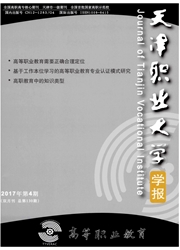

 中文摘要:
中文摘要:
产业集群技术升级需要大量掌握新兴技术的技术技能人才,这为职业教育发展带来机遇与挑战。根据产业组织理论,产业集群可分为马歇尔式集群和轮轴式集群两种类型,二者的技术创新与人员培训具有很大差异。因此职业院校开展相关专业的产学合作教育应采取不同的策略,以促进产学合作的稳定性、有效性、先进性,并实现人才培养的规模化。以广东地区物流业和新能源汽车制造业两个集群的产学合作教育作为典型案例进行对比分析,对马歇尔式集群职业院校应加强与行业协会的联系、依托行业协会开展产学合作,而对轮轴式集群职业院校则应直接与龙头企业开展校企合作,从而提高产业集群劳动者技术技能水平、推动集群技术转型升级和产业经济发展。
 英文摘要:
英文摘要:
Technology upgrading of industrial clusters needs a large number of technical talents who master the emerging technolo- gy, which brings opportunities and challenges to vocational education. Based on the theory of industrial organization, industrial clus- ters can be divided into two types-Marshall cluster and wheel shaft cluster, which have different characteristics in technology inno- vation and personnel training. Therefore, vocational colleges should adopt different strategies to carry out the industry-college coop- eration education, so as to promote the stability, availability and advancement of the cooperation and realize the scale development of talents training. Comparing and analyzing the industry-college cooperation education in logistics and new energy vehicles indus- try in Guangdong area as the two typical cases, vocational colleges should strengthen links and cooperation with the industry associa- tions in Marshall cluster, while directly carry out the college-enterprise cooperation with leading enterprises in wheel shaft cluster. This will improve the laborers' skills, promote technology transformation and upgrading and industrial economic development in in- dustry clusters.
 同期刊论文项目
同期刊论文项目
 同项目期刊论文
同项目期刊论文
 期刊信息
期刊信息
